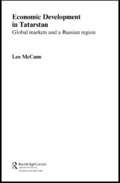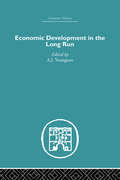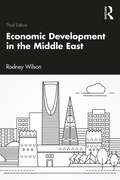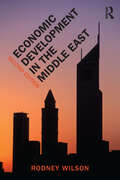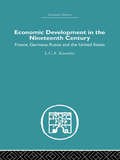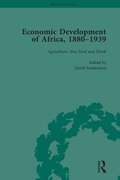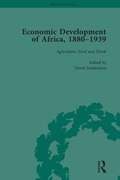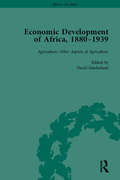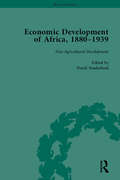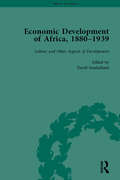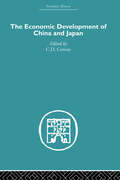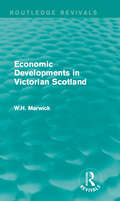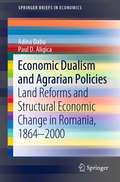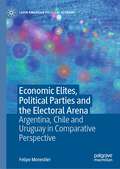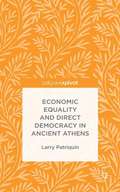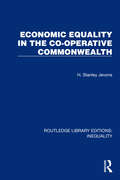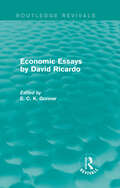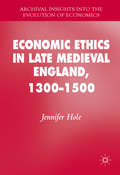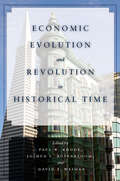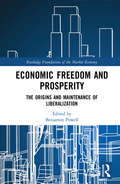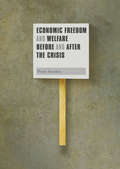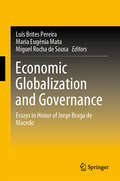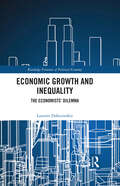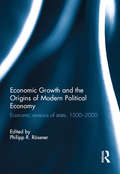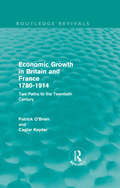- Table View
- List View
Economic Development in Tatarstan: Global Markets and a Russian Region (Routledge Contemporary Russia and Eastern Europe Series #Vol. 4)
by Leo McCannBased on extensive original research in the Republic of Tatarstan, in the Central Volga region of Russia, this book examines the economic development path followed by Tatarstan since the collapse of the Soviet Union and the Russian financial crash of 1998. It argues that the roles of global capitalism and globalisation are somewhat exaggerated in much contemporary academic literature. In the case of Tatarstan, a strong state role, tightly-knit local elite networks, and the inheritance of the Soviet politic and industrial systems are the most important socio-economic formations in explaining the region's development.
Economic Development in the Long Run (Economic History Ser.)
by A. J. YoungsonThis book enlarges our understanding of economic development by bringing together items or aspects of historical experience relevant to the present-day problems of developing countries; by looking at the problems over a longer period than is usual in development economics, so that the influence of underlying forces may be made evident; and by comparing the experiences of different countries in similar situations. A variety of countries are dealt with and most of the significant problems in development economics are covered in one context or another. The authors of this symposium, each an internationally acknowledged authority, offer expert assessments of development as it has actually taken place. The chapter by Professor Rosovsky shows what is significant, what is peculiar and what could be imitated in Japan; Professor Black takes the little-studied case of Ireland, and Dr Macpherson gives an informed and balanced account of Indian development. This unique book was first published in 1972.
Economic Development in the Middle East
by Rodney WilsonThis new edition examines how development in the Middle East is being influenced by global economic change. This comparative textbook focuses on the region’s strengths, and highlights development success, especially in the Gulf, Turkey and Israel. The major structural changes in the economies of the Middle East are analysed and current employment challenges are discussed. The impact of demographic changes is considered, notably the dramatic decline in birth rates which will have implications for future employment. The contribution of banks and capital markets to the region’s development is appraised, including that of Islamic financial institutions which play a prominent role in the Gulf Cooperation Council (GCC) countries but are on the margins of the financial systems elsewhere. Historically, development in the GCC was linked to oil and gas production and prices, a key issue being whether these are being decoupled as economies diversify and become more self-sustaining. The evidence on this from the GCC is encouraging, with transparent and accountable financial management and major improvements in economic governance despite the lack of democracy. Examining the drivers of economic development in the Middle East in a regional and global context, this fully updated textbook is a key resource for students and academics interested in economic development and the political economy of the Middle East.
Economic Development in the Middle East, 2nd edition (Routledge Studies In Development Economics Ser.)
by Rodney WilsonBy examining economic development in the Middle East in the aftermath of the Arab Spring, this textbook introduces undergraduate and postgraduate students to the most pressing and topical economic issues in the contemporary Middle East. With comprehensive coverage of the entire region, the author examines the economic prospects for the Gulf and charts the growth of economic power in the region. Organised thematically, a full range of topics are discussed, including: the role of banks and capital markets in the region’s development the impact of demographic changes, such as the dramatic decline in birth rates and the implications for future employment the development of economic advances in oil and gas production the effects of the region’s economic development on international and inter-regional trade. Through discussing the region’s problems of the past as well as the present and future challenges, this book provides students with a compact and manageable review of the state of economic development in the Middle East.
Economic Development in the Nineteenth Century: France, Germany, Russia and the United States
by L.C.A. KnowlesTaken in conjunction the author’s earlier Industrial and Commercial Revolutions in Great Britain during the Nineteenth Century, this classic volume provides a thoroughly workmanlike study of the rise and progress of industrialism. Here she surveys the main developments in the agricultural, industrial, mechanical transport and commercial policy of France. Germany, Russia and the United States. It provides the handiest manual available of the comparative history of industrialism. It is an absolute godsend to students. This book was first published in 1932.
Economic Development of Africa, 1880-1939 vol 1
by David SunderlandOne of the main motives for British imperialism in Africa was economic gain. This collection examines the ways in which Britain developed Africa, and, in so doing, benefited her own economy.
Economic Development of Africa, 1880-1939 vol 2
by David SunderlandOne of the main motives for British imperialism in Africa was economic gain. This collection examines the ways in which Britain developed Africa, and, in so doing, benefited her own economy.
Economic Development of Africa, 1880–1939 vol 3: Agriculture - Other Aspects Of Agriculture (Britain And Africa Ser.)
by David SunderlandOne of the main motives for British imperialism in Africa was economic gain. This collection examines the ways in which Britain developed Africa, and, in so doing, benefited her own economy.
Economic Development of Africa, 1880–1939 vol 4: Agriculture - Other Aspects Of Agriculture (Britain And Africa Ser.)
by David SunderlandOne of the main motives for British imperialism in Africa was economic gain. This collection examines the ways in which Britain developed Africa, and, in so doing, benefited her own economy.
Economic Development of Africa, 1880–1939 vol 5
by David SunderlandOne of the main motives for British imperialism in Africa was economic gain. This collection examines the ways in which Britain developed Africa, and, in so doing, benefited her own economy.
Economic Development of China and Japan
by C. D. CowanFirst published in 2005. Routledge is an imprint of Taylor & Francis, an informa company.
Economic Developments in Victorian Scotland (Routledge Revivals)
by W.H. MarwickMarwick argues that economic development in Scotland was severely delayed until the 18th Century unlike neighbouring countries. Originally published in 1936, this study aims to explore key features of economic development in Victorian Scotland to promote more understanding of this issue. Issues discussed include ownership of land and capital, administration and finances of industry, organisation of trade and marketing, labour and recruitment, trade unions, housing and other aspects which impact on the standard of life. This title will be of interest to students of Economics and Industrial History.
Economic Dualism and Agrarian Policies: Land Reforms and Structural Economic Change in Romania, 1864–2000 (SpringerBriefs in Economics)
by Adina Dabu Paul D. AligicaThis book offers an in-depth case study of Romania’s land and agricultural reforms from mid-19th century and up to 2000, offering a historical account of agricultural reforms in post-communist Romania in the light of more than a century of social and economic development experiments. Taking a ‘dual economy’ analytic perspective, the book examines the impact of structural and agricultural reforms on the country's economic development and provides an analysis of the ideas and models that stood behind policy reforms aiming at the modernization of an economy and society defined by dualism and late development.
Economic Elites, Political Parties and the Electoral Arena: Argentina, Chile and Uruguay in Comparative Perspective (Latin American Political Economy)
by Felipe MonestierThis book delves into the intricate dynamics between economic elites and the political party system in Argentina, Chile, and Uruguay, particularly during their democratization phases in the twentieth century. It introduces a novel framework for comprehending the diverse political strategies adopted by these countries’ economic elites during this critical period. The central premise of this book is that the interplay between the cohesion of economic elites and the mobilization of popular sectors at specific historical junctures profoundly influences the nature of elite political involvement.While existing literature has extensively discussed the strategies employed by economic elites to safeguard their interests, this book takes a fresh approach by considering three primary configurations of relationships between economic elites and political parties. It explores cases where economic elites are the primary constituency of parties they have founded, as well as instances where upper-class interests are predominantly defended outside the party system through mechanisms such as the armed forces, pressure groups, and lobbying. Additionally, it examines scenarios where economic elites align themselves with parties boasting a polyclass constituency, exerting limited influence over these parties.This book goes beyond traditional analyses by proposing a theory that elucidates how the interaction between elite cohesion and popular sector mobilization determines the specific forms of elite political involvement. It also charts the historical sequences of this process, emphasizing the evolution of the causal relationship over time.To illustrate this theory, the book employs a comparative historical analysis, scrutinizing the three aforementioned cases to identify factors that account for the different forms of economic elite political participation. It discerns that the level of cohesion among economic elites and the degree of mobilization among popular sectors are pivotal factors shaping elite-party relationships.
Economic Equality and Direct Democracy in Ancient Athens
by Larry PatriquinThis book argues that ancient democracy did not stop at the door of economic democracy, and that ancient Athens has much to tell us about the relationship between political equality and economic equality. Athenian democracy rested on a foundation of general economic equality, which enabled citizens to challenge their exclusion from politics.
Economic Equality in the Co-Operative Commonwealth (Routledge Library Editions: Inequality #5)
by H. Stanley JevonsOriginally published in 1933 in the midst of the Great Depression, this book discussed the possibility of a new and orderly economic system to realize social justice. The author argued that nothing but the complete equality of reward could ensure a stable order. Although utopian in its outlook, the book addressed many of the concerns of the (then) existing order. The book explains the origin of differences between different people, give a brief account of the economic theory of the capitalist system and investigates the economics of the growing demand for social and economic equality. It then discusses in more detail the most efficient economic organization to provide and safeguard the welfare of the population on the basis of equality, followed by a discussion of the economic principles involved in price-fixing and foreign trade.
Economic Essays by David Ricardo: Economic Essays By David Ricardo (Routledge Revivals)
by E. C. K. GonnerDavid Ricardo (1772 – 1823) was a hugely influential British political economist and stock trader. This volume, first published in 1923, contains five important pamphlets published by him, edited and with an overarching introductory essay by E. C. K. Gonner. Each essay relates either to monetary and financial subjects - including the high price of Bullion, monetary theory and the position of the Bank of England - or to the agricultural conditions of Britain and proposed solutions to the problems discussed. This is a fascinating and detailed work, which will be of great value to those with an interest in Ricardo’s theories and British economic history.
Economic Ethics in Late Medieval England, 1300–1500
by Jennifer HoleDrawing on an array of archival evidence from court records to the poems of Chaucer, this work explores how medieval thinkers understood economic activity, how their ideas were transmitted and the extent to which they were accepted. Moving beyond the impersonal operations of an economy to its ethical dimension, Hole's socio-cultural study considers not only the ideas and beliefs of theologians and philosophers, but how these influenced assumptions and preoccupations about material concerns in late medieval English society. Beginning with late medieval English writings on economic ethics and its origins, the author illuminates a society which, although strictly hierarchical and unequal, nevertheless fostered expectations that all its members should avoid greed and excess consumption. Throughout, Hole aims to show that economic ethics had a broader application than trade and usury in late medieval England.
Economic Evolution and Revolution in Historical Time
by Paul W. Rhode Joshua L. Rosenbloom David F. WeimanThis book challenges the static, ahistorical models on which Economics continues to rely. These models presume that markets operate on a "frictionless" plane where abstract forces play out independent of their institutional and spatial contexts, and of the influences of the past. In reality, at any point in time exogenous factors are themselves outcomes of complex historical processes. They are shaped by institutional and spatial contexts, which are "carriers of history," including past economic dynamics and market outcomes. To examine the connections between gradual, evolutionary change and more dramatic, revolutionary shifts the text takes on a wide array of historically salient economic questions-ranging from how formative, European encounters reconfigured the political economies of indigenous populations in Africa, the Americas, and Australia to how the rise and fall of the New Deal order reconfigured labor market institutions and outcomes in the twentieth century United States. These explorations are joined by a common focus on formative institutions, spatial structures, and market processes. Through historically informed economic analyses, contributors recognize the myriad interdependencies among these three frames, as well as their distinct logics and temporal rhythms.
Economic Freedom and Prosperity: The Origins and Maintenance of Liberalization (Routledge Foundations of the Market Economy)
by Benjamin PowellEconomic theory and a growing body of empirical research support the idea that economic freedom is an important ingredient to long-run economic prosperity. However, the determinants of economic freedom are much less understood than the benefits that freedom provides. Economic Freedom and Prosperity addresses this major gap in our knowledge. If private property and economic freedom are essential for achieving and maintaining a high standard of living, it is crucial to understand how improvements in these areas have been achieved and whether there are lessons that can be replicated in less free areas of the world today. In this edited collection, contributors investigate this research question through multiple methodologies. Beginning with three chapters that theoretically explore ways in which economic freedom might be better achieved, it then moves on to a series of empirical chapters that examine questions including the speed and permanence of reform, the deep long-run determinants of economic freedom, the relationship between voice and exit in impacting freedom, the role of crises in generating change, and immigration. Finally, the book considers the evolution of freedom in China, development economics, and international trade, and it concludes with a consideration of what is necessary to promote a humane liberalism consistent with economic freedom. Economic Freedom and Prosperity will be of great interest to all social scientists concerned with issues of institutional change. It will particularly appeal to those concerned with economic development and the determinants of an environment of economic freedom.
Economic Freedom and Welfare Before and After the Crisis
by Petar StankovThis book offers an extensive review of market-oriented economic reforms since 1970, and considers the question of whether more liberal economic policy yields greater social welfare. The author demonstrates that, despite the widespread uniformity of economic policy across countries over the past 45 years, welfare differences persist. Stankov posits that the crisis has stalled the momentum of economic freedom reforms across the globe and policy agendas have gradually shifted from pro-market to pro-redistribution. The book argues that this shift is inevitable: market-oriented economics, Stankov notes, is the natural bedfellow of populism. Through rigorous empirical methodology and the use of various case studies, Stankov is among the first to offer an empirical explanation.
Economic Globalization and Governance: Essays in Honor of Jorge Braga de Macedo
by Maria Eugénia Mata Luís Brites Pereira Miguel Rocha de SousaReflecting the diverse and profound changes triggered by the latest wave of economic globalization, this book highlights various governance responses at national, regional and global levels. The topics covered are wide-ranging and include economic history and development, European integration, exchange rate arrangements, industrial and labor economics, international cooperation and multilateralism, and public choice.The book is divided into three parts: The first part, which contains contributions by Barry Eichengreen and Marc Flandreau, is devoted to economic history. The second part examines open economy macroeconomics with a focus on Europe, including contributions by Jurgen von Hagen and Paul Krugman. The third part presents contributions to international political economy, and related interdisciplinary topics. This Festschrift is written in honor of Jorge Braga de Macedo, Professor Emeritus of Economics at the Nova School of Business and Economics and a distinguished Portuguese academic whose work has an impressive global reach. The contributions, written by a selection of international authors, deal with his oeuvre covering the wide range of topics broached in this book, as his publication record amply attests.
Economic Growth and Inequality: The Economists' Dilemma (Routledge Frontiers of Political Economy)
by Laurent DobuzinskisIn an era of increasing inequalities, and also of deep anxieties about the consequences of two major economic crises, economists are faced with a major question: can economic growth be achieved without inequalities? Economic Growth and Inequality critically evaluates the economic literature on this question from a pragmatic perspective, seeking to reconcile those who regard economic liberties as a paramount value, and critics who object that prioritizing these liberties leads to inequitable outcomes. The book presents an overview of the models used by economists to define and measure inequalities and the ongoing dialogues between political philosophers and economists in an effort to find solutions to the problems. It explores Rawlsian justice, Sen’s capability theory, and the theory of rent and compares and contrasts the most often discussed institutions and policies designed for remedying poverty and reducing inequalities. This book marks a significant contribution to the literature on some of the most pressing problems of our time and will be of great interest to readers of political economy, public policy, moral philosophy, and history of economic and political thought.
Economic Growth and the Origins of Modern Political Economy: Economic reasons of state, 1500–2000
by Philipp R. REconomic Growth and the Origins of Modern Political Economy addresses the intellectual foundations of modern economic growth and European industrialization. Through an examination both of the roots of European industrialization and of the history of economic ideas, this book presents a uniquely broad examination of the origins of modern political economy. This volume asks what can we learn from ‘old’ theories in terms of our understanding of history, our economic fate today, and the prospects for the modern world’s poorest countries. Spanning across the past five hundred years, this book brings together leading international contributors offering comparative perspectives with countries outside of Europe in order to place the evolution of modern economic knowledge into a broader reference framework. It integrates economic discourse and the intellectual history of political economy with more empirical studies in economic history and the history of science. In doing so, this innovative volume presents a coherent and innovative new strategy towards a reconfiguration of the history of modern political economy. This book is suitable for those who study history of economic thought, economic history or European history.
Economic Growth in Britain and France 1780-1914: Two Paths to the Twentieth Century (Routledge Revivals)
by Patrick O'Brien Caglar KeyderFirst published in 1978, Professor O’Brien’s Economic Growth in Britain and France 1780-1914 is an original and pioneering exercise in comparative and quantitative economic history. It finds a controversial place in the debate on the question of French retardation in the 19th century and as a brave and important contribution towards the understanding of economic growth in Western Europe. The author attempts to comprehend and evaluate the economic performance of France through explicit comparisons with Britain, while considering British economic history from a French perspective. Challenging the orthodox view that France lagged behind Britain in economic terms, the book argues that there were two paths of economic growth to the 20th century, with France’s path seen as a more humane and no less efficient transition to industrial society.
